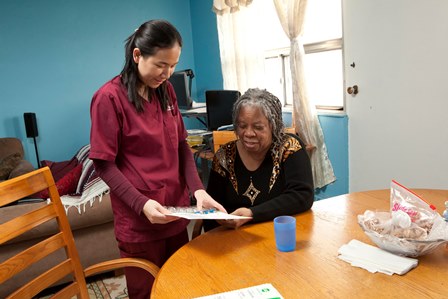By Tim Pauley
It is estimated that half of us don’t take our medications properly. The consequences for individuals, and the health care system are significant. “Medication non-adherence” is responsible for an astonishing one quarter of Emergency Department visits and nursing home admissions, and is estimated to cost the Canadian health care system $7 billion annually. The most common issue in non-adherence is missed doses (39%).
These difficulties are compounded for people taking many medications for multiple chronic conditions, and for those with cognitive impairment. For individuals living at home, family members and caregivers can help with reminders, but this can still leave gaps during the day when they may forget.
In recent years, new technologies have hit the market to address this challenge, and an upcoming study involving clients of Toronto Central Local Health Integration Network (LHIN) is set to evaluate one of them, Circura + Reminder Rosie from LifeAssist Technologies. The multi-site, randomized controlled trial is being supported by the Centre for Aging and Brain Health Innovation (CABHI) at Baycrest Health Sciences, through one of the largest research grants Toronto Central LHIN has ever been awarded.
The relationship between Toronto Central LHIN and LifeAssist Technologies began last year during a test pilot conducted by LHIN home care pharmacists Andrea Calvert and Kate Walsh, and Rapid Response Nurse Majid Valerio, in which different medication reminder devices were tested with ten clients. “We wanted to find a way to help clients who were struggling to take their medications as directed. Rosie stood out for ease of use,” reports Calvert.
 Reminder Rosie looks like a tablet-based alarm clock, but instead of beeping, it plays voice recordings left by family members or the patient themselves. “Dad, take one blue pill after lunch,” it might say at 1pm. Simple voice-activated prompts allow messages to be recorded easily. Reminders to test blood glucose or for medical or other appointments can also be added. For patients, the device can promote self-management and independence.
Reminder Rosie looks like a tablet-based alarm clock, but instead of beeping, it plays voice recordings left by family members or the patient themselves. “Dad, take one blue pill after lunch,” it might say at 1pm. Simple voice-activated prompts allow messages to be recorded easily. Reminders to test blood glucose or for medical or other appointments can also be added. For patients, the device can promote self-management and independence.
The reminder component of Circura + Reminder Rosie is being evaluated for this trial, but it can also be linked to a secure virtual communications environment, in which patient information and health data can be viewed on a mobile phone application by an individual’s circle of care (home care staff, primary care, family members or others), and members of that circle can communicate with each other. Additional biometric data (e.g. blood pressure, blood glucose levels, walking activity, weight) can be collected using Bluetooth-enabled technology, to provide comprehensive remote monitoring of patient health. In home care, the reach of health professionals is extended: a nurse driving to monitor patients in their home may only reach 3-4 in a day; but using virtual monitoring, 20-25 clients could be monitored in the same time period, reducing costs while increasing monitoring intervals.
The research trial demonstrates Toronto Central LHIN’s unique ability to drive innovation in home care, and will evaluate medication adherence, resource utilization, patient satisfaction and patient participation in health management. Sixty people receiving home care from Toronto Central LHIN who have mild to moderate cognitive impairment and are struggling to take their medications as prescribed by their doctor will be selected to participate in the study, which will randomly assign half to receive standard community care and half to receive standard community care plus Circura + Reminder Rosie.
The one-year study runs until fall 2018.
Tim Pauley is Manager, Research & Knowledge Mobilization at Toronto Central LHIN and Principal Investigator for the study. Healthcare professionals with questions can reach him at Tim.Pauley@tc.lhins.on.ca


